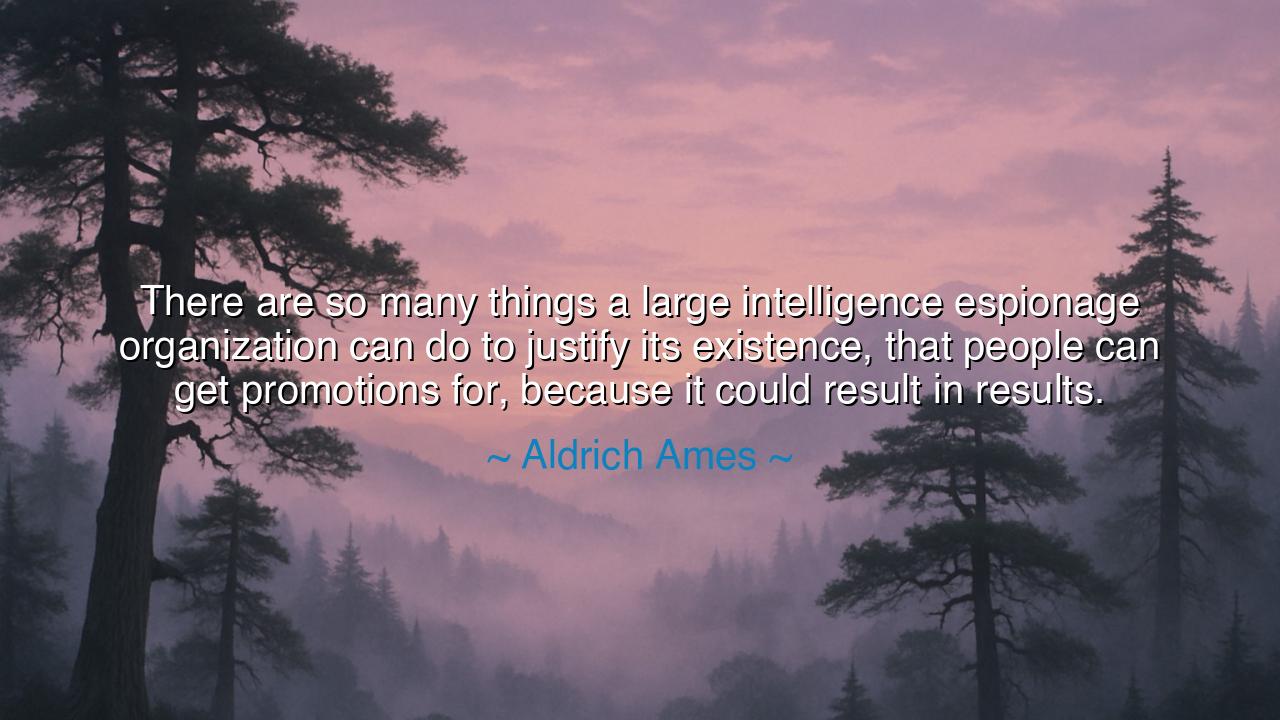
There are so many things a large intelligence espionage
There are so many things a large intelligence espionage organization can do to justify its existence, that people can get promotions for, because it could result in results.






“There are so many things a large intelligence espionage organization can do to justify its existence, that people can get promotions for, because it could result in results.” Thus spoke Aldrich Ames, a man who once served at the shadowed heart of power — and then betrayed it. His words, though tainted by treachery, strike at a timeless truth about the nature of institutions, the hunger of ambition, and the quiet corrosion of purpose. For within his reflection lies not only a critique of espionage, but a parable of all human systems — how the desire for recognition can eclipse the desire for truth, and how the machinery of bureaucracy, once born to protect, may grow to serve only itself.
Ames knew this truth not as an outsider, but as one who lived within the secret labyrinths of intelligence agencies, where men and women toil unseen, weaving webs of information, chasing whispers, and shaping nations through shadows. Yet he saw that in such a vast machine, the appearance of achievement often outweighed its substance. Operations were launched, not because they were necessary, but because they were useful to careers. Reports were written to impress superiors, not to enlighten them. Thus, the agency, like a serpent devouring its own tail, began to live not for truth, but for survival — its agents laboring to justify its existence, not fulfill its mission.
In these words, we hear not merely the lament of a disillusioned spy, but the echo of an ancient warning. The Roman historian Tacitus once wrote that when empires grow too vast, their servants begin to mistake motion for meaning — that they conquer not out of need, but out of habit. The same spirit infects every great organization, from the bureaucracies of empires to the corporations of the modern age. The gears continue to turn long after the purpose is forgotten, and those who feed the machine learn that reward comes not from wisdom, but from activity that looks like victory.
Ames, who himself betrayed his oaths for greed and resentment, spoke this truth from the ruins of his own soul. He saw that even within the guardians of nations, vanity and self-preservation can thrive. Like the priests of Babel, they build towers not to reach heaven, but to prove they are indispensable. In such a system, even the most intelligent minds become captives of illusion. For when every action must justify itself with “results,” truth becomes secondary to appearance, and conscience yields to calculation. Thus, what was once intelligence becomes performance, and what was once service becomes careerism.
History abounds with examples of this tragedy. Consider the mighty Soviet Union, whose vast intelligence apparatus — the KGB — consumed countless lives, not to uncover truth, but to sustain its own myth of necessity. Agents spied on neighbors, files multiplied, and men were promoted for the “results” of fabricated discoveries. In time, the system that claimed to protect the state instead poisoned it from within. When truth finally rose like dawn, the empire that feared it crumbled. So it is with all powers that value image above integrity — they collapse not from attack, but from the weight of their own pretense.
Ames’s observation, though born from cynicism, carries a warning for every generation: beware the illusion of productivity without purpose. Whether in governments, corporations, or one’s own life, the temptation to act for appearance — to do, not for truth, but for approval — is the beginning of decay. The wise must pause and ask: “Does this serve the mission, or only the machine? Does this action bring light, or only the shadow of progress?” For even noble institutions can lose their way when men cease to remember why they began.
Therefore, O seeker of wisdom, learn from this dark saying: do not confuse motion with meaning, nor reward with righteousness. Let your labors be guided not by the applause of the powerful, but by the clarity of purpose within your heart. Build not to justify your existence, but to fulfill your calling. For in a world where systems grow large and souls grow small, the truest act of rebellion is to remain authentic, honest, and faithful to truth. Remember: the mightiest empires have fallen, but the individual who acts with integrity — who does what is right rather than what is rewarded — becomes eternal.






AAdministratorAdministrator
Welcome, honored guests. Please leave a comment, we will respond soon